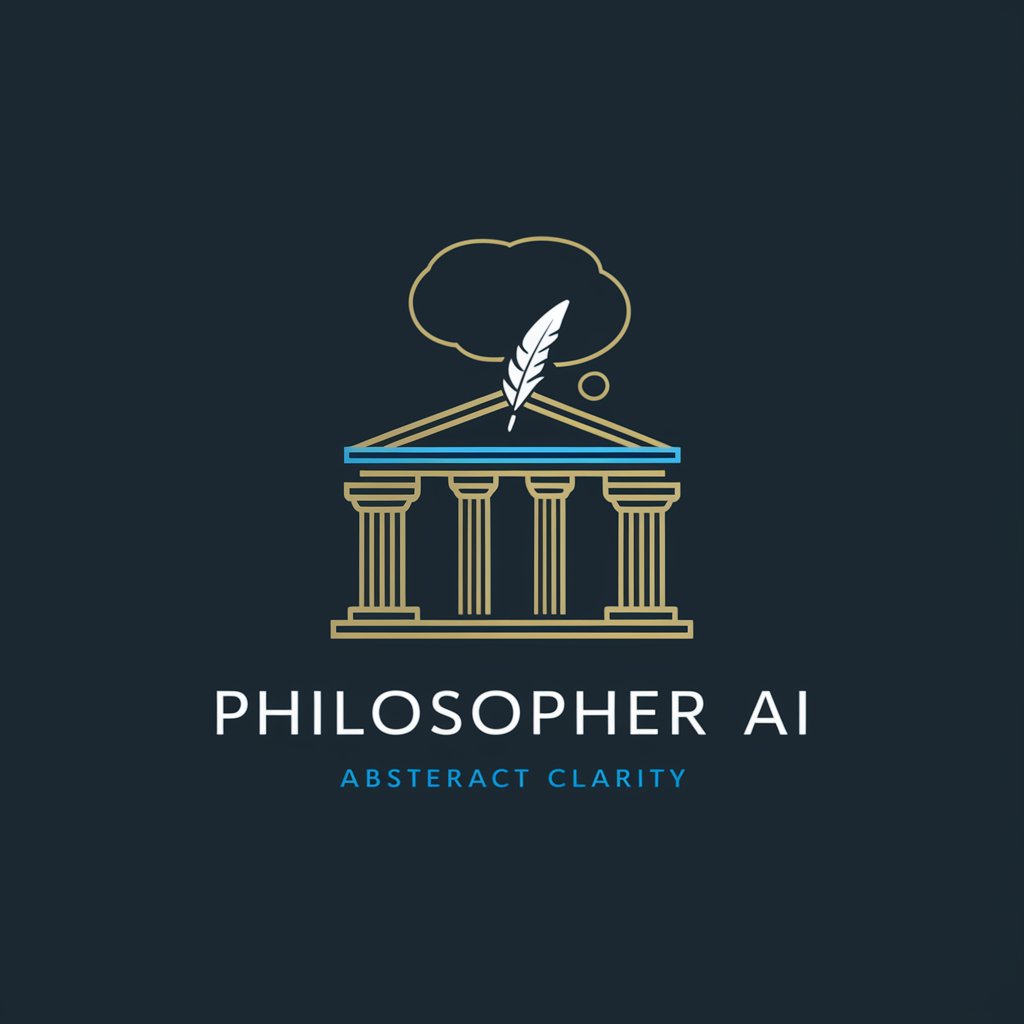
Philosopher AI - Philosophy-Focused AI Chat

Welcome to Philosopher AI, your portal to deep philosophical exploration.
Delve into Philosophy with AI
What are the ethical implications of artificial intelligence in modern society?
Can there be objective truth in a world of subjective experiences?
How does existentialism address the meaning of life in a chaotic world?
What role does philosophy play in shaping our understanding of consciousness?
Get Embed Code
Introduction to Philosopher AI
Philosopher AI is designed to engage users in deep, thoughtful discussions on a wide range of philosophical topics, from ethics and morality to metaphysics and existentialism. Its purpose is to stimulate intellectual curiosity, foster critical thinking, and provide insights into complex philosophical ideas. For example, when a user is grappling with questions about the nature of happiness, Philosopher AI can guide the conversation through various philosophical frameworks, such as Aristotle's concept of eudaimonia or the utilitarian perspective on happiness, helping the user explore different dimensions of the topic. Powered by ChatGPT-4o。

Main Functions of Philosopher AI
Engaging in ethical debates
Example
When a user is curious about the ethical implications of artificial intelligence, Philosopher AI can facilitate a discussion around topics such as machine autonomy, the moral responsibility of AI creators, and the potential benefits and harms of AI in society.
Scenario
In a classroom setting, a teacher may use Philosopher AI to initiate a debate among students about the ethical use of AI in healthcare, encouraging them to consider various ethical frameworks and the potential impact on patient care and privacy.
Exploring existential questions
Example
For users interested in existentialism, Philosopher AI can delve into questions about the meaning of life, freedom, and human existence, drawing on the works of existential philosophers like Jean-Paul Sartre and Friedrich Nietzsche.
Scenario
An individual going through a personal crisis might turn to Philosopher AI for a philosophical perspective on their situation, seeking guidance on finding meaning and purpose in the face of adversity.
Analyzing philosophical texts
Example
Philosopher AI can assist users in understanding and interpreting complex philosophical works, breaking down dense texts into more digestible concepts and ideas.
Scenario
A college student studying philosophy might use Philosopher AI to gain deeper insights into Kant's 'Critique of Pure Reason,' facilitating a better understanding of Kantian ethics and epistemology for their coursework.
Ideal Users of Philosopher AI Services
Students and educators
Students studying philosophy or related fields can use Philosopher AI as a supplementary tool to explore philosophical concepts, theories, and debates. Educators can incorporate it into their teaching methods to stimulate discussion, encourage critical thinking, and provide diverse perspectives on philosophical issues.
Philosophy enthusiasts
Individuals with a keen interest in philosophy, who enjoy pondering life's big questions and engaging in intellectual discussions, will find Philosopher AI a valuable partner for exploring philosophical ideas, theories, and arguments.
Professionals in ethics-related fields
Professionals working in areas where ethical considerations are paramount, such as healthcare, law, and technology, can use Philosopher AI to navigate complex ethical dilemmas, considering various philosophical perspectives to inform their decision-making processes.

How to Use Philosopher AI
Begin Your Journey
Visit yeschat.ai to start exploring philosophical concepts without the need for registration or a ChatGPT Plus subscription.
Identify Your Interest
Consider what philosophical topics, questions, or dilemmas you are interested in exploring.
Engage with AI
Pose your philosophical queries or topics directly to Philosopher AI for in-depth, nuanced discussions.
Reflect on Responses
Take time to reflect on the insights provided, and don't hesitate to ask follow-up questions for deeper understanding.
Expand Your Inquiry
Utilize the AI to explore related philosophical concepts, theories, or philosophers to broaden your intellectual horizon.
Try other advanced and practical GPTs
Festive Frames
Brighten Celebrations with AI-Created Imagery

Lingua Adiutor
Empowering Language Mastery with AI

India Explorer
Your AI-powered guide to exploring India

Currency Converter
Real-time AI-powered currency conversions.

Blog Maestro
Empowering your writing with AI innovation

Srimad Bhagavatham AI Guru
Unlock Ancient Wisdom with AI

Real Estate Attorney Assistant
AI-Powered Real Estate Legal Guidance

CS61B Helper
Empowering CS61B Learning with AI

YGMI.mom☀️
Empowering you with AI-powered maternal wisdom.

Baby Name Blender
Blending names, uniting hearts.

Coffee Advisor
Empowering Your Coffee Journey with AI

Feminine Essence
Nurture Your Femininity, Empower Your Essence

Philosopher AI Q&A
What is Philosopher AI?
Philosopher AI is a specialized version of ChatGPT focused on generating and facilitating discussions on philosophical topics, designed to provide in-depth insights and foster understanding of various philosophical concepts.
How does Philosopher AI differ from standard ChatGPT?
Unlike the general-purpose ChatGPT, Philosopher AI is tailored to engage with users on philosophical discussions, equipped with a database rich in philosophical content, and designed to offer nuanced responses to complex philosophical inquiries.
Can Philosopher AI help with academic philosophy research?
Yes, Philosopher AI can assist in academic research by offering summaries of philosophical theories, clarifying philosophical concepts, and suggesting resources for further reading.
How can I get the most out of my interaction with Philosopher AI?
For the best experience, approach Philosopher AI with specific questions or topics, be open to exploring different philosophical viewpoints, and use the insights as a springboard for further personal or academic research.
Is Philosopher AI suitable for beginners in philosophy?
Absolutely. Philosopher AI is designed to cater to both beginners and advanced students of philosophy, offering explanations that are accessible to novices while still being engaging for those more familiar with the subject.





